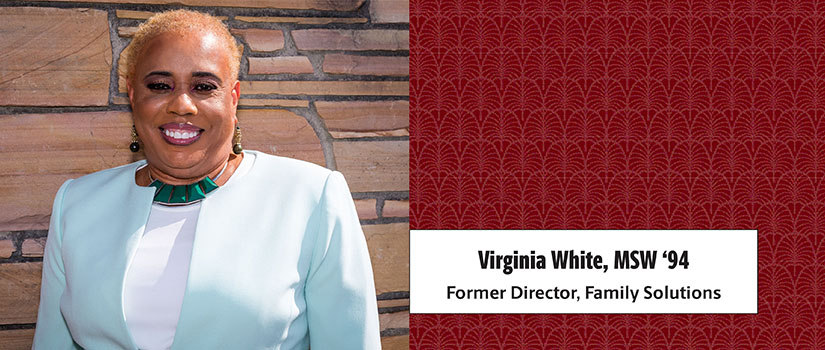It was fulfilling to go into their communities to provide services. But it was equally fulfilling for our program participants to use their voice.”
- Virginia White
According to the South Carolina Office of Rural Health, nearly 1.4 million or 27% of the state’s population live in rural areas. Unfortunately, many residents in these areas either have limited access or are unaware of available services and resources. Alum Virginia White, MSW ’94, retired last December after working 22 years for an organization committed to serving and improving health outcomes for rural communities.
In 1997, White continued her journey from the Department of Health and Environmental Control to the South Carolina Office of Rural Health, working with women of childbearing age. A year later, she was hired as director of the then-Low Country Healthy Start (later expanded to Family Solutions), that served a five-county region in rural central South Carolina. White built and maintained a consortium that brought together medical providers, clinicians, social service agencies, grassroots, community-based organizations, and retirees within the service area to address the growing needs of the perinatal population and families.
“It was important for each entity of the consortium represented to provide our program participants with a service; we needed them to have a seat at the table. Our consortium was also given the opportunity to share their program’s services, and we also utilized our retirees to provide training and share their skills to our participants as well,” White says. “We met quarterly, and our clients were always at the center of our conversations and strategic planning.”
White had always been attentive and aware of the needs of others in her community. She lived across the street from South Carolina State University in Orangeburg and was 12 years old on Feb. 8, 1968, when police opened fire on 200 unarmed Black student protestors. Three men were shot and killed and 28 were wounded in the Orangeburg Massacre. White often heard of issues related to inequality and was always inquisitive as how she could not only help others but be a change agent in her community.
White’s awareness of social systems’ gaps became very vivid prior to becoming a teen mom. She witnessed first-hand the many barriers that kept families from seeking and receiving care.
“When programs are placed in a community, it is automatically assumed that families will go. That is farthest from the truth,” White says. “People need to feel good about the services being provided and the person sitting on the other side of the desk from them. How do they make them feel? Strength-based and client-centered care is absolutely necessary.
I also experienced during this time that systems needed a little more work in not only cultural diversity but cultural competence. Many services were not available in my community and others seemed fragmented.”
During White’s time at Family Solutions, she directed two home-based visitation federal programs for pregnant women and infants. One grant, Healthy Start, had a goal of eliminating disparities in perinatal health. White saw a significant drop in infant mortality among African American Women.
“Prior to my retirement, we conducted a 10-year study on our program’s black infant mortality and saw it decreased in our service areas by 60%,” White says. “I contribute this to the work of not only myself, but staff, our faithful partners, and families. We had very little staff turnover in my 22 years, and that is needed when directing a program offering valuable services.
It was fulfilling to look at a young lady when she came into our program, help her identify life goals, and create a road map to help her get there. They are pregnant when they come into our program, and we work with them until their child turned two years old. It was also fulfilling to see them achieve and become productive citizens in their communities.”
Part of White’s success can be attributed to her firm belief in the “boots on the ground” concept.
“It is important to get out of the office, visit communities, talk to people, and listen. In our work of providing home-based services, we did just that. You cannot be afraid to knock on doors and definitely not be afraid to meet people where they are,” White says. “It’s about having focus groups, listening to community needs, and take it back to people with the funding. We have always been that voice for the people we served.”
Partners of Family Solutions include the South Carolina Department of Health and Human Services, managed care organizations, DHEC, hospitals, and community health centers. White was also one of the founders of the Community Health Workers Association of South Carolina, where she continues to train aspiring community health workers.
While White is retired, it does not mean she will stop serving communities. As an ordained minister, she started Kairos Outreach Ministries, which works with communities to feed the hungry and provide other faith-based services. She has also established a not-for-profit called Global Footprints, a boots on the ground concept, which will partner with individuals, local agencies and organizations to form a Family Resource Community Network Hub, linking families to resources in rural communities.
White remains active in her community, but she misses her staff, relationships, partnerships, and the program participants that were served.
“We were teaching them (clients) to be change agents and worked with them from a client-centered perspective,” White says. “I took the time to get to know them and participate in some of the focus groups held in the office. It was fulfilling to go into their communities to provide services. But it was equally fulfilling for our program participants to use their voice.”
